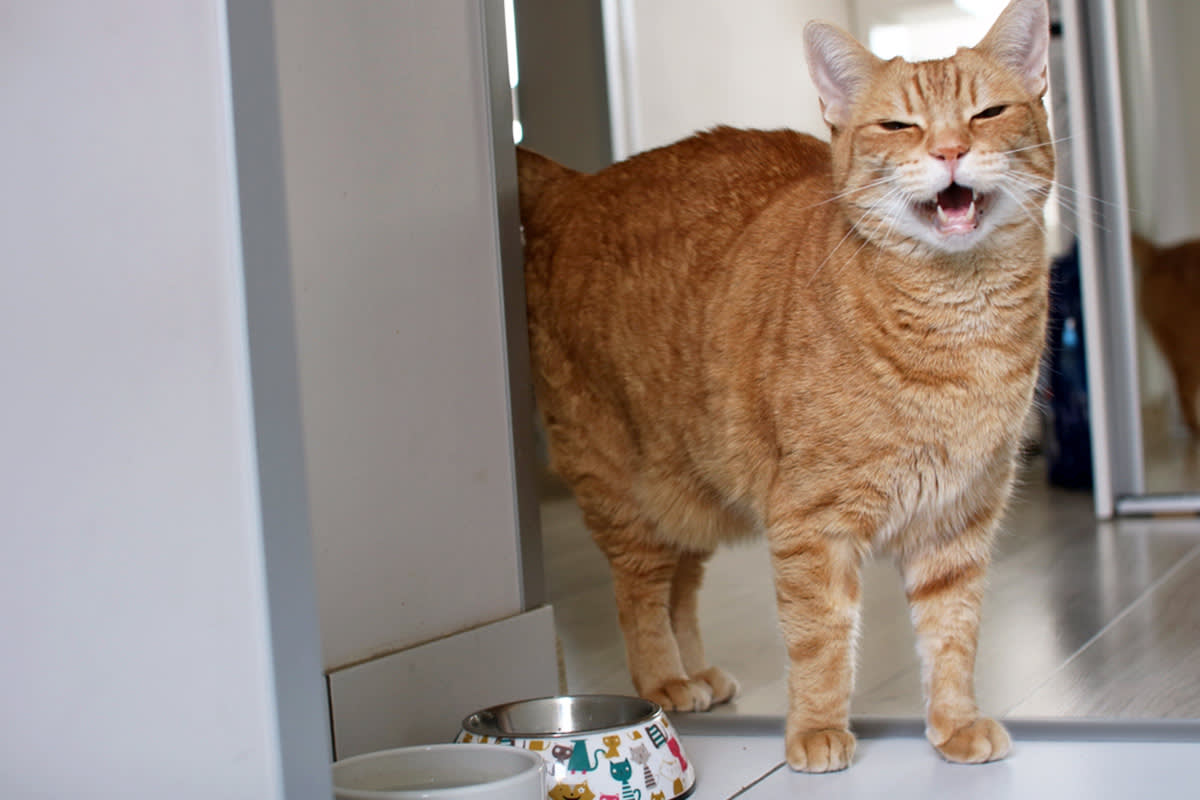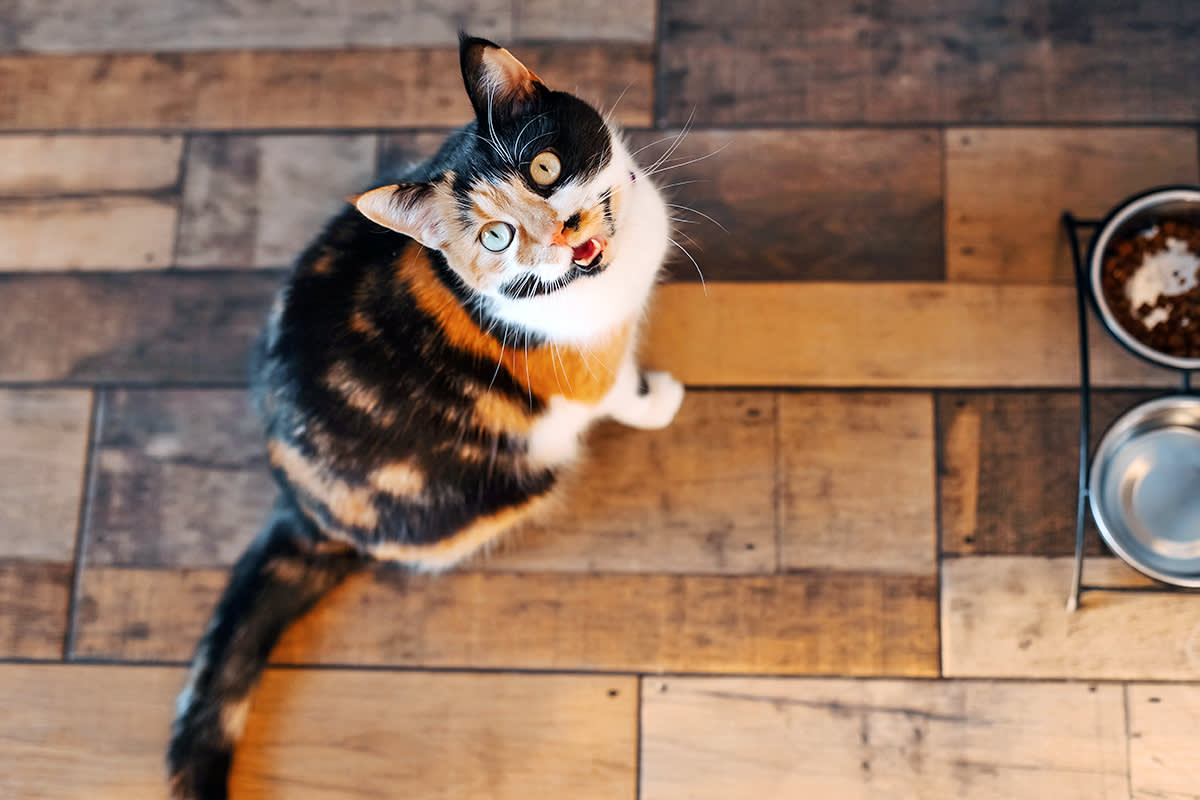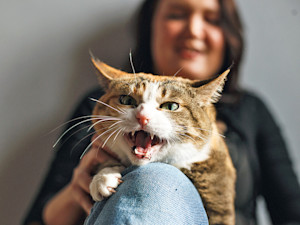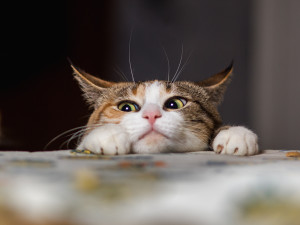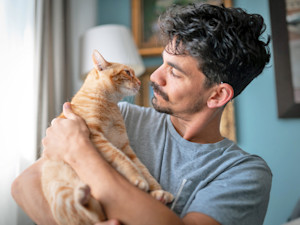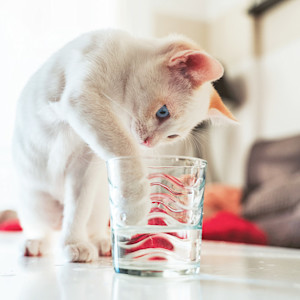Why Cats Get So Loud When You Break Out Their Dinner
They can see the food is coming, so why keep meowing so much?
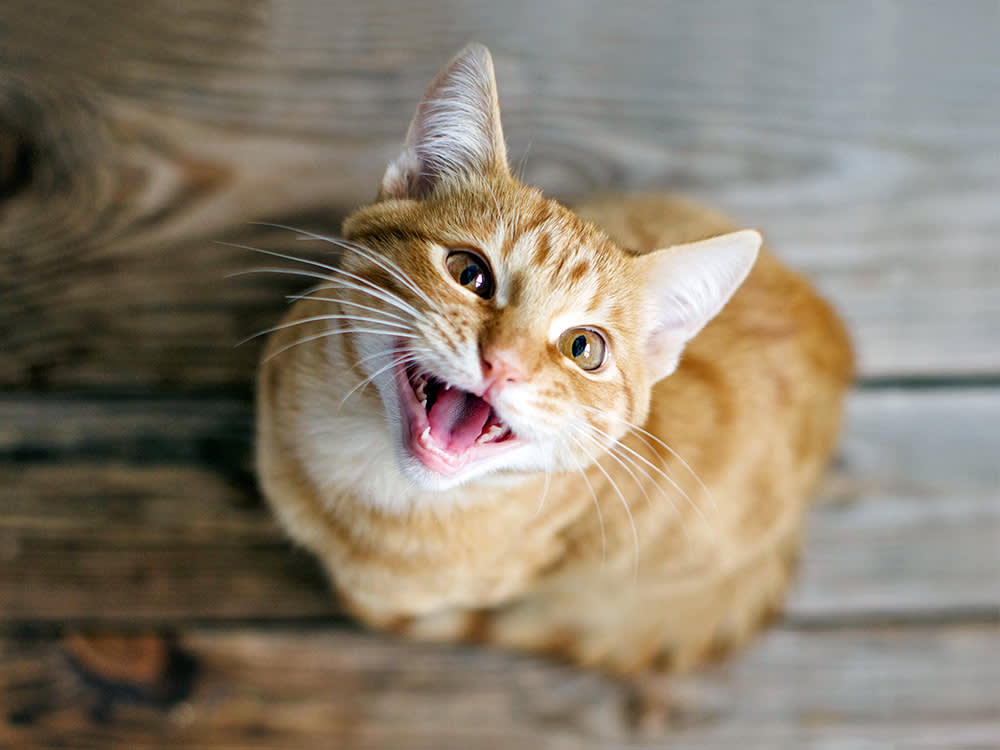
Share Article
Cats are not known for their patience. At least, my cats aren’t. Most mornings, as I stumble into the kitchen to crack open a can of Funk in the Trunk (their favorite), all three of them are under my feet, seemingly starving after a long night of not being catered to. Freddy likes to bite the backs of my ankles as I mix warm water into her dish of food, while her little brothers, Winston and Wilbur, hang back.
Occasionally, they pipe up with a plaintive, pitiful meow if I’m not quick enough. My cats’ nips and meows aren’t so bad, but some cats yowl as soon as their caregivers take the food out, the urgency of their meows increasing as mealtime draws closer. (For example, watch this room full of rescue catsopens in new tab, who turn into a veritable choir when they see food coming.)
Why do they do this? Whether you find your cat’s meows adorable or they set your teeth on edge, it’s a question many cat parents find themselves asking. It makes sense that our cats would meow to tell us they’re hungry or to remind us that mealtime was five minutes ago, but when they see that we’re on the case and they’re about to get fed, why not sit back and relax? Or are they just saying “thank you” in advance?
In an attempt to get to the bottom of this feline mystery, I talked to certified cat behaviorists Stephen Quandtopens in new tab and Joey Lusvardiopens in new tab, as well as veterinarians Dr. Liza Cahnopens in new tab, a consultant for Embrace Pet Insuranceopens in new tab, and Dr. Geri Katz, an advisor at Pet Honestyopens in new tab.

Meows work on humans.
“When cats communicate with each other, they often use non-verbal cues,” Dr. Katz tells me. “Cats have learned, however, that when they want to communicate with humans, vocalizing is a more successful method.” And while we, the cat parents, know that we’re about to put the food bowls down for our hungry little babies, our cats may not be so sure. “Meowing is their surefire way of ensuring that they will get their needs met,” Dr. Katz says. “A content cat rarely meows.”
“Cats may meow at mealtime to express their hunger, excitement for a meal, or simply because they have learned that this behavior results in attention and feeding,” Dr. Cahn confirms. “Kittens meow at their mother to solicit care, and domestic cats have retained this trait, using it primarily as a communication tool to get food or attention from humans.”
So, by feeding our cats when they meow at us, are we teaching them that this potentially annoying behavior works? “Meowing is both instinctive and learned,” Quandt says. “Their ability to do it is instinctive and inborn, but doing it to get something specific is often learned.”
Lusvardi agrees: “Learning absolutely plays a huge role in this behavior. Chances are, at one point, your cat was meowing so your first thought was they were hungry. Your cat made the association between food and them meowing, so they did it again.” And that, he says, is how we accidentally train our cats to meow when they see food.
How can you quiet the racket?
Cat behaviorist Quandt says that over-vocalizing (otherwise known as meowing a lot) is a frequent complaint of cat parents he’s worked with over the years. “At mealtime, the meowing should be self-limiting because when dinner arrives, the cat is satisfied and would rather eat than meow,” he explains. “But generally speaking, cats meow because meowing gets them what they want. If your cat is meowing too much, you have a choice: either give in and give them what they wantopens in new tab, or try and wait them out.”
Of course, when it comes to mealtime, waiting them out isn’t really an option. So what can a cat parent do to get a little peace and quiet while preparing their cat’s meals?
“It’s easy to accidentally reinforce loud meowing at mealtimes if a behavior (like loud meowing) is followed by a reward (like being fed),” Dr. Cahn says. “While in some cases this is unavoidable, sticking to specific meal times, automatic feeders, interactive feeding toys, and attempting to wait until the cat is calm and quiet before feeding may be beneficial.”
If you want to stop the mealtime meowing, Lusvardi says the best thing to do is feed your cat more often. “You may not necessarily need to feed them more, but feeding more meals is how cats prefer to eat, and will prevent them from becoming as hungry.” He recommends feeding cats up to six small meals a day. “If that’s not practical, even four feedings can make a huge difference,” he says. Automatic feeders are an option, as well. “[An automatic feeder] removes you from the equation and is very predictable for your cat,” Lusvardi says. “They’ll know when food is coming.”
Dr. Cahn says that if your cat is meowing up a storm when they see food, the first thing to do is check that the cat’s basic needs are being met. Are you feeding them an appropriate amount of food? Are you playing with them enough? “Feeding toys, such as thisopens in new tab, are a great way to provide mental stimulation and physical exercise for your cat, while allowing them to exercise their natural hunting instincts,” she tells me. “If medical concerns have been ruled out and meowing is excessive or disruptive, seeking help from a veterinary behaviorist may be recommended.”
When should you be concerned?
Sometimes, a meowing cat is a cat in true distress. “There are instances when it is appropriate to be more concerned about cats meowing around feeding,” Dr. Katz says. “If they meow for the food and then walk away, this may be a sign that they are in pain, particularly in their mouths. Cats that have oral pain can be quite vocal as the food is presented to them, but then just walk away in frustration.” She says, too, that cat parents should regularly discuss their kitty’s nutritional needs with their veterinarian.
“Cats have different nutritional requirements in different life stages,” Dr. Katz says. “When a cat is being underfed for its life stage, the vocalization is a survival mechanism.” Does your cat seem hungry, even when you’re feeding them what feels like more than enough food? They could be sending you a signal. “Certain diseases like diabetes and hyperthyroidism will cause [cats] to feel chronically undernourished, since these diseases interfere with normal food absorption,” Dr. Katz explains. “If the food doesn’t get absorbed, they will feel ravenous!”
The bottom line, according to Dr. Katz: “If your cat seems hungry all the time but is not putting on more weight, or if they are meowing for food and walking away, they need to see a veterinarian to help diagnose and treat them appropriately.”
Can cats say thank you?
With all I do for my cats, maybe meowing during feeding time is just their way of saying thanks. Could it be? When I run my theory past the experts, the response is mixed. “While cats may certainly express their affection or satisfaction with body language and vocalizationsopens in new tab, the concept of saying thank you is human,” Dr. Cahn says.
Lusvardi, though, says that meowing can be friendly: “[Meowing] can be a way of showing that they like us. I think that’s a form of thanking us!”
Quandt concurs: “If they give a little trill or chirp when presented with their meal, I would take this as a thank you.”
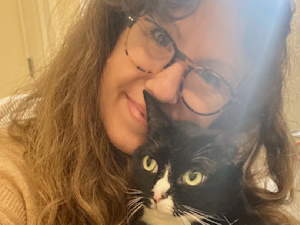
Elizabeth Laura Nelson
Elizabeth Laura Nelson is a writer and editor based in Brooklyn, New York, whose work has appeared in The New York Times, Jenny, Best Life, YourTango, Elite Daily, and more. She focuses her work on relationships, health and wellness, midlife, and lifestyle. As a child, Elizabeth was scared of cats (claws and teeth, yikes) but she has since gotten over her fear and now shares her home with three sweet and gentle feline companions who make life better (and cuddlier) every day.
Related articles
![Cat meowing while sitting with woman at home.]()
What Is ‘Caterwauling’—and Why Do Cats Do It?
It’s definitely a sign that something is off.
![Cat grabbing onto ledge of table and looking to the left]()
Why Does My Cat Follow Me Everywhere?
Yes, they are right behind you.
![Man holding his cat at home.]()
The 8 Most Misunderstood Cat Behaviors
They can be confusing little creatures, but they aren’t knocking things over just to mess with you.
![Woman holding her white cat in her arms.]()
Does Your Cat Think You’re Their Baby? They Sure Do Lick You a Lot
This internet is saying cats think they are the parents, not the other way around.
![Cute kitten sticking paw into water glass.]()
Why Do Cats Always Dip Their Paws in Water?
“Splish splash, I was taking a bath!”
Why Is Your Cat Always Hungry?
Even if you don’t think they should be.
